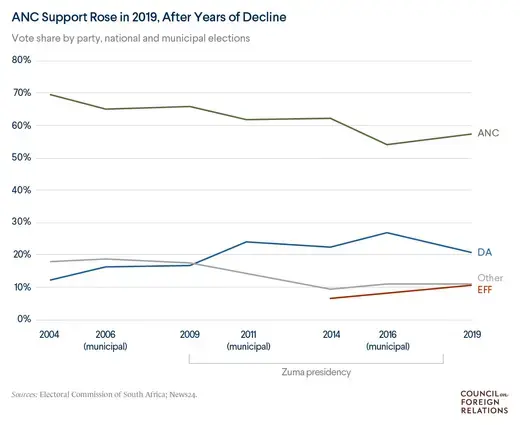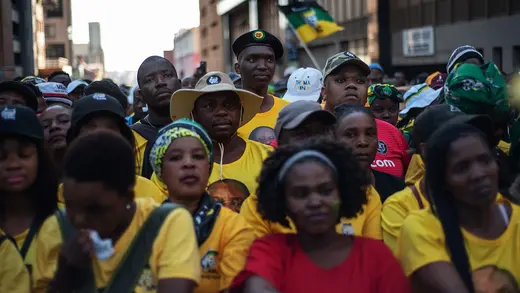What the ANC’s Election Win Means for South Africa
The African National Congress, which has governed since the end of apartheid, won again in May’s national election. But a growing opposition will watch to see whether it can revive the economy and curb corruption.

By experts and staff
- Published
By
- John CampbellRalph Bunche Senior Fellow for Africa Policy Studies
The ruling African National Congress (ANC) kept its majority in last week’s general election, heading off challenges from several opposition parties. The vote gives the party, and President Cyril Ramaphosa, a mandate to make good on its promises to tackle corruption and boost South Africa’s economy, which is sub-Saharan Africa’s most modern.
The Results
The ANC won a majority in the National Assembly with 58 percent of votes, a drop from the last national election in 2014 but slightly better than its performance in the 2016 municipal elections. The main opposition party, the Democratic Alliance (DA), lost some ground, winning roughly 20 percent of votes. At the same time, the Economic Freedom Fighters (EFF), a radical left-wing party that splintered from the ANC in 2013, doubled its share of the vote since the last national election, winning 10 percent. South Africans also voted for provincial legislatures, with the ANC winning all but the Western Cape, which is held by the DA.

While the ANC has won a small reprieve, it appears that the country is moving away from one-party dominance toward greater pluralism. In all, a record fourteen parties made it into the National Assembly.
A Growing Opposition?
The DA’s support largely comes from racial minorities, who make up about 20 percent of the population. Already associated with good government, the rule of law, and respect for the constitution, the DA has made efforts in recent years to rebrand itself as more than a predominantly white party, but it continues to struggle to attract black voters, and it was again unsuccessful in its push to form a government.
The EFF, which has advocated for redistribution of white wealth to blacks, gained votes mostly at the expense of the ANC. It did not make the breakthrough from spoiler to serious contender as it had hoped, but growing support for that party signals that its platform is resonating with some South Africans.
A Disenchanted Electorate
Voter turnout has declined from 89 percent to 65 percent over the past two decades. South Africans born after the end of apartheid in 1994, known as “born frees,” appear to have largely stayed away from the polls. They were not part of the struggle against white supremacy, and they see the ANC more as a standard political party than as a liberation movement.

The decline likely reflects disillusionment with the government’s management of the economy and corruption within the ruling party, though the trend is common in new democracies. Economic growth has been low over the past decade, and progress for South Africa’s poorest has stalled. Black unemployment still stands at more than 40 percent. Graft and mismanagement is rampant at state-owned enterprises like the electricity monopoly Eskom, whose problems have led to frequent blackouts.
What Comes Next
Ramaphosa can now claim that he has halted the party’s decline, which began under his predecessor, President Jacob Zuma, and that his reform agenda is starting to pay off. Since Zuma was forced out in 2018 amid numerous corruption allegations, Ramaphosa has led efforts to clean up the party and state-owned enterprises, as well as to marginalize ANC members who continue to pledge allegiance to the disgraced Zuma. Among the party leadership Ramaphosa faces stiff opposition; among the public he is more popular.
The continued decline in voter participation is a bad sign for South African democracy.
So can Ramaphosa build on his political capital? The continued decline in voter participation is a bad sign for South African democracy. And, for the first time since the transition to democracy, there was serious criticism by minority parties of the electoral commission’s technical conduct, though most South Africans see the elections as credible. The EFF’s racist rhetoric and calls for the expropriation of white property, which has received outsize media attention, will likely discourage domestic and international investors, who could help jumpstart the moribund economy.
Ramaphosa can continue his program of reforming the ANC, tackling the state-owned enterprises that became nests of corruption under Zuma and strengthening his hold on the party machinery, much of which is still beholden to the former president. Ramaphosa has also indicated he will seek to restore the country’s regional role, which atrophied under Zuma, who curried favor with authoritarian regimes.
South Africa’s democracy is becoming ever more vibrant as the ANC’s political dominance recedes. Ultimately, though, this year’s election did not set a fundamentally new trajectory for postapartheid South Africa.